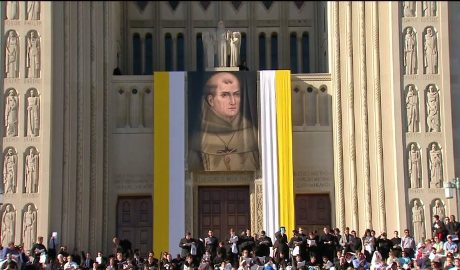Pope Francis has declared controversial Franciscan missionary Junipero Serra a saint, in a move which has drawn criticism from Native Americans.
At a Mass outside the Basilica of the National Shrine of the Immaculate Conception in Washington, DC, on September 23, Serra became the first saint canonised on US soil.
The Pope praised Serra’s treatment of Native Americans, calling him a “protector of Native Americans”.
He “sought to defend the dignity of the native community, to protect it from those who had mistreated and abused it”, Francis said.
“Mistreatment and wrongs which today still trouble us,” Francis continued, “especially because of the hurt which they cause in the lives of many people.”
The Pope portrayed the 18th century Spanish missionary Serra as the “embodiment of ‘a Church which goes forth’, a Church which sets out to bring everywhere the reconciling tenderness of God”.
Fifty different tribes in California condemned the sainthood conferred on Serra, said Deborah Miranda, a literature professor at Washington and Lee University in Virginia and a member of the Ohlone Costanoan Esselen Nation of California.
The missions ended up killing about 90 per cent of the California Native Americans present at the time of missionisation, Miranda said.
This created “all kinds of cultural and emotional baggage that we still carry to this day”, she said.
A Native American campaign to stop Serra’s canonisation never gained a hearing in Rome, Miranda added.
There have been accusations that Serra forced Christianity on the region, was complicit in the decline or elimination of native populations, and enslaved converts to the faith.
Fr Timothy Kesicki, SJ, said many scholars acknowledge Serra’s complicated legacy.
“But I don’t think Pope Francis wants pristine saints,” Fr Kesicki continued, “because then no one will aspire to sainthood.”
The canonisation Mass was celebrated in Spanish, but the readings were in various languages, including one in chochenyo, a Native American language.
Sources
